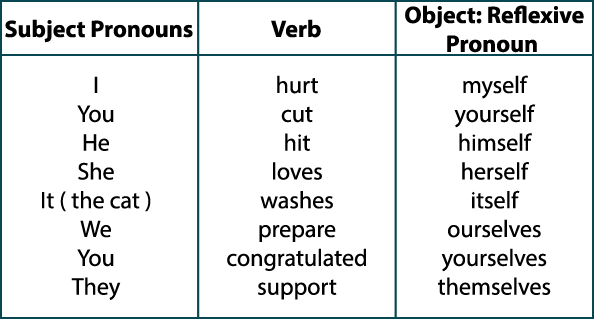reflexive pronouns
Have you heard about the grammar of reflexive pronouns in English? Let's learn about reflexive pronouns with EnglishTopVN through this article.
1. Concepts
- Reflexive pronouns, also known as reflexive pronouns, are an English pronoun. Pronouns are used to replace a noun. Myself, yourself, himself, herself, himself, ourselves, yourselves, themselvesare words of this word type, corresponding todifferent English pronouns.
For example:
- I don’t think I can do it by myself, I really could use some help.
- Do it yourself, other people seem to be busy as well.
Conversion table of personal pronouns - reflexives:
| Pronouns | reflexive pronouns |
| I | Myself |
| You | Yourself/Yourselves (plural) |
| We | Ourselves |
| They | Themselves |
| He | Himself |
| She | Herself |
| It | Itself |
2. Position of reflexive pronouns in the sentence
Reflexive pronouns are usually in the position after verbs, after prepositions, after subject nouns and at the end of sentences.
Reflexive pronouns come after the verb
For example:
- If you don’t love yourself, you cannot accept love from other people.
| Personal | Me | Us | You | It | Her | Him |
| Reflect | Myself | Ourselves | Yourself/Yourselves | Itself | Herself | Himself |
Reflexive pronouns come after prepositions
For example:
- Stop putting pressure on yourselves, you guys look really burned out.
Reflexive pronouns come after nouns
For example:
- Even the teachers themselves cannot solve this Maths problem, it is just too hard.
Reflexive pronouns come at the end of the sentence.
For example:
- This sounds fishy, I’ll investigate this issue myself.
3. How to use reflexive pronouns
Reflexive pronouns have three uses corresponding to their position in the sentence:
Reflexive pronouns used as objects
When the subject and object refer to the same person or thing, we can use a reflexive pronoun to replace the object.behind some verbs.
For example:
-
The kids were playing in the backyard and accidentally hurt themselves.

Reflexive pronouns used as objects of prepositions
When the subject and object refer to the same person or thing, the reflexive pronoun comes second preposition and be the object of that preposition.
For example:
-
He told himself to stay calm and collected.
Reflexive pronouns are used to emphasize the subject of action
When the reflexive pronoun comes after the subject or at the end of the sentence, it will emphasize the noun that is the subject of the sentence..
For example:
-
Annie herself cannot understand her husband sometimes.
-
Can you believe what I said now that you saw it yourself?

